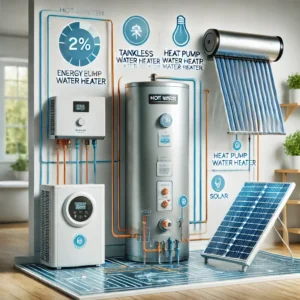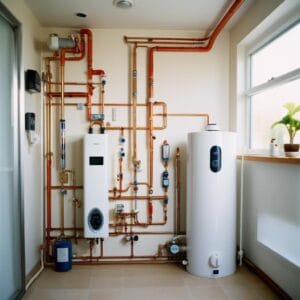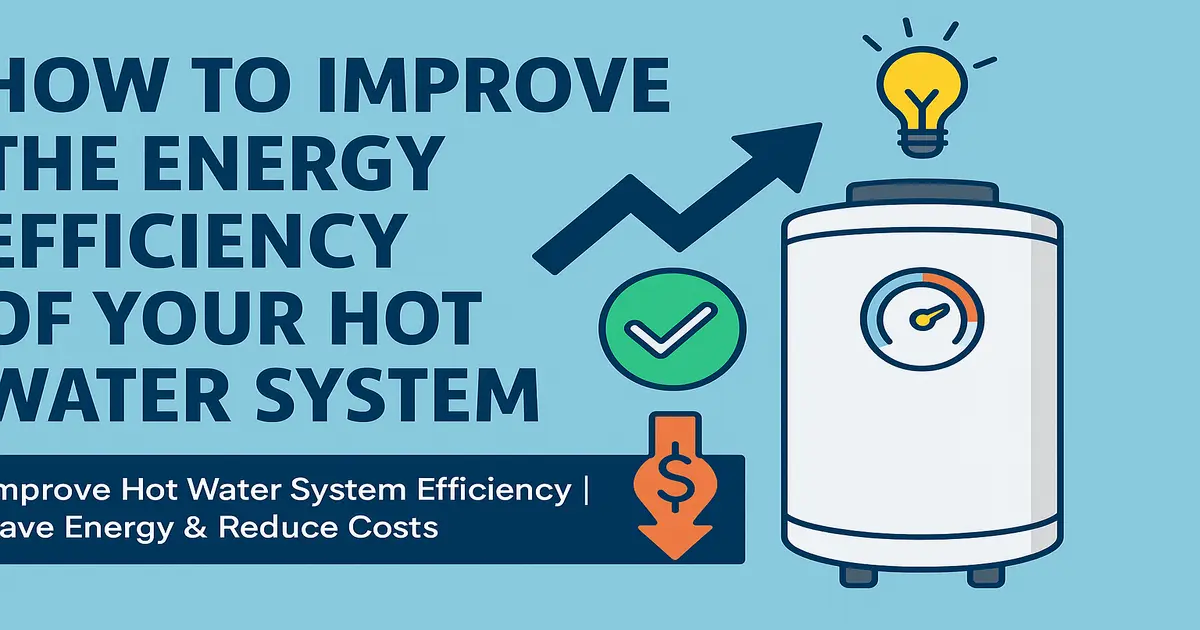How to Improve the Energy Efficiency of Your Hot Water System
Are rising energy bills and environmental concerns making you rethink your household energy usage? A key area to target is your hot water system. With a few practical changes, you can enhance its energy efficiency, cut costs, and contribute to a more sustainable future.

In this comprehensive guide, we’ll explore strategies to boost your hot water system’s performance and ensure it operates at peak efficiency.
Why Energy Efficiency Matters
Improving the energy efficiency of your hot water system offers two major benefits:
- Lower Energy Bills: An efficient system consumes less energy, directly reducing your utility costs.
- Environmental Impact: By reducing energy consumption, you lower your household’s carbon footprint and support sustainability efforts.
Learn more about reducing your carbon footprint on the EPA’s official website.
Hot water systems are one of the largest energy consumers in most homes. Addressing inefficiencies in this area can have a significant impact on overall energy usage.
Step 1: Assess Your Current System
The first step in improving energy efficiency is understanding your current hot water system. Conduct an audit to evaluate its components and performance.
Inspect the Age and Type
Older systems often lack modern energy-saving features. If your system is more than 10 years old, consider upgrading to a newer, more efficient model. Common types of hot water systems include:
- Traditional Tank Systems: Store hot water but experience standby heat loss.
- Tankless Systems: Heat water on demand, eliminating standby losses.
- Heat Pump Systems: Use ambient air to heat water efficiently.
- Solar Systems: Harness solar energy for water heating, reducing reliance on electricity or gas.
Compare different types of water heaters on the U.S. Department of Energy website.
Check Insulation
Proper insulation is crucial for minimizing heat loss. Inspect the insulation on your water tank and pipes:
- Tank Insulation: If your tank feels warm to the touch, it may need additional insulation.
- Pipe Insulation: Insulate hot water pipes to retain heat and reduce energy waste.
For more tips on insulating your water system, visit Energy Star’s guide to water heater insulation.
Step 2: Upgrade to an Energy-Efficient System
If your current system is outdated or inefficient, upgrading to a modern system can yield significant energy savings.
Tankless Water Heaters
Tankless water heaters, also known as on-demand systems, heat water only when needed. Benefits include:
- Up to 30% energy savings compared to traditional systems.
- Compact design that saves space.
- Longer lifespan than tank systems.
Explore tankless water heaters on Energy Star’s website.
Heat Pump Water Heaters
Heat pump water heaters transfer heat from the surrounding air to heat water. While the initial cost is higher, they use significantly less electricity, leading to long-term savings.
Solar Water Heaters
Solar water heaters are an eco-friendly option that utilizes solar panels to heat water. Though installation costs can be high, government incentives and long-term savings make them an attractive choice.
Learn about federal tax credits for solar systems.
Step 3: Implement Simple Efficiency Practices
Not every improvement requires a major investment. These small changes can make a big difference:
Lower the Thermostat Temperature
Set your water heater’s thermostat to 120°F (49°C). This temperature is safe for most household needs and prevents overheating while saving energy.
Reduce Hot Water Usage
- Take shorter showers.
- Fix leaky faucets and pipes promptly.
- Use cold water settings in washing machines when possible.
Schedule Regular Maintenance
Routine maintenance ensures your system operates efficiently. Key tasks include:
- Flushing the tank annually to remove sediment.
- Checking for leaks and replacing worn-out components.
- Inspecting the pressure relief valve for proper function.
Install Water-Saving Fixtures
Low-flow showerheads and faucets reduce water consumption, lowering the energy required to heat water. These fixtures are affordable, easy to install, and effective.

Use a Timer or Smart Controls
Timers and smart devices allow you to schedule water heating during off-peak hours, optimizing energy usage. Smart thermostats can also learn your household’s habits and adjust settings automatically.
Step 4: Adopt Energy-Saving Behaviors
Your personal habits play a significant role in energy efficiency. Encourage everyone in your household to:
- Turn off taps when not in use.
- Wash dishes and laundry with full loads to minimize hot water use.
- Take showers instead of baths to conserve water.
Step 5: Explore Renewable Energy Options
Incorporating renewable energy sources into your hot water system can dramatically enhance efficiency:
- Solar Panels: Generate electricity for your water heater.
- Hybrid Systems: Combine solar energy with traditional or heat pump systems for optimal performance.
Benefits of an Energy-Efficient Hot Water System
The advantages of improving your hot water system’s energy efficiency include:
- Cost Savings: Reduced energy consumption leads to lower utility bills.
- Environmental Benefits: Decreased reliance on fossil fuels supports global sustainability efforts.
- Increased System Lifespan: Efficient systems experience less wear and tear, requiring fewer repairs and replacements.
- Enhanced Comfort: Consistent water temperature improves your overall quality of life.
Discover more benefits of energy-efficient systems.
Seek Professional Assistance
If you’re unsure about the efficiency of your hot water system, consult a professional. They can:
- Conduct a detailed assessment of your system.
- Recommend upgrades or modifications.
- Ensure safe and efficient installation of new systems.
Find licensed professionals in your area for expert guidance.
Internal Resources
- Learn more about home energy efficiency
- Steps to improve your home’s insulation
- Adopt energy-saving habits
Conclusion
Improving the energy efficiency of your hot water system is a rewarding investment that benefits both your wallet and the planet. By upgrading to modern systems, adopting energy-saving habits, and leveraging renewable energy sources, you can enjoy reliable hot water while minimizing energy costs and environmental impact.
Start your journey toward a more efficient home today and reap the long-term rewards of sustainability and comfort.
